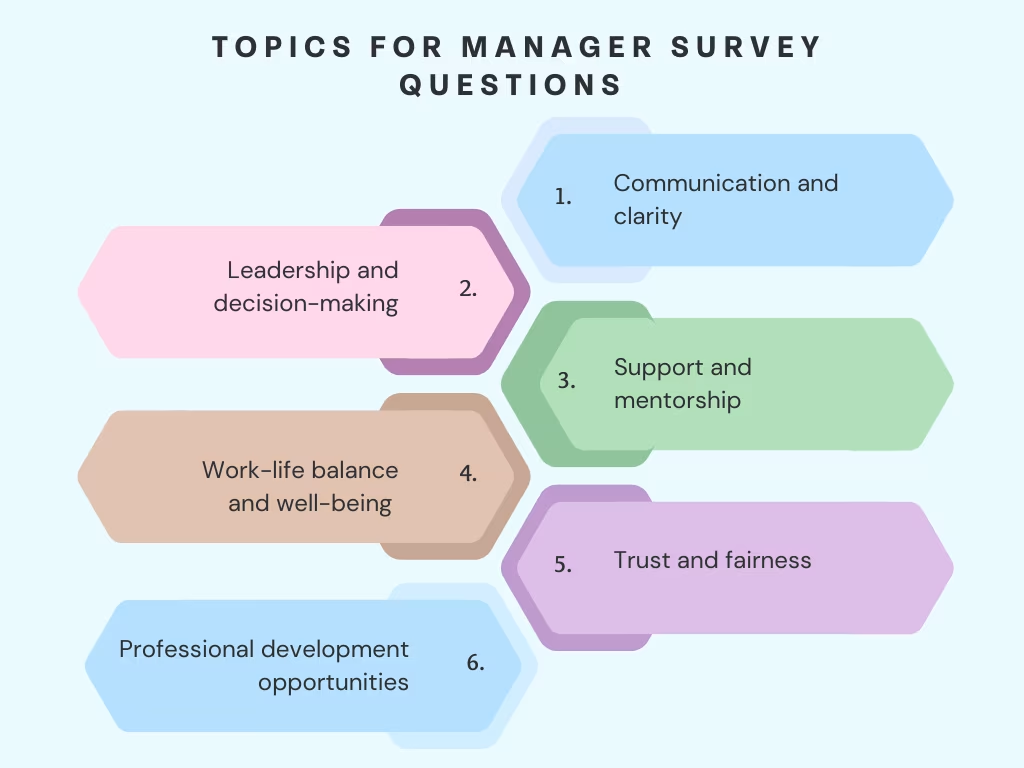Most of us have experienced performance reviews where managers review our work. The tables can turn though. A manager feedback survey lets employees give constructive input about their supervisor's leadership abilities, communication skills, and how well they perform overall.
These surveys create a valuable feedback loop that moves upward, unlike traditional top-down evaluations. They include carefully crafted questions to learn about a manager's strengths and areas they can improve. Questions cover several leadership aspects from how clearly they communicate to their decision-making, mentoring abilities, and support for work-life balance.
Companies use these surveys differently. Some make them part of a complete 360 feedback system that gathers input from peers, team members, and the manager's supervisor. Others use them as standalone tools every quarter or year.
The goal isn't criticism, it's growth. Good manager feedback questionnaires show both strengths to build on and areas where leadership skills need work. They are the foundations of customized development plans that track improvement over time.
Smart survey design changes traditional hierarchies into shared environments. Leadership quality keeps improving based on direct input from team members. This method shows that team members often give the best insights about how effective their managers really are.

Why manager feedback surveys are important
Top companies spend time and resources to gather feedback about their managers for a good reason: leadership quality directly affects organizational success. Manager feedback surveys help improve leadership, strengthen team trust, and boost how much employees get involved in their work.
Improving leadership through employee insights
Leaders need input from others. Employees who work with leaders every day know best about what works and what doesn't. These surveys help managers learn about their effectiveness and show them specific areas where they can grow. This knowledge helps them become more understanding and flexible.
The numbers tell an interesting story: managers influence 70% of the variance in team engagement. Regular feedback lets them match their leadership style to what their team needs. They can guide employee growth better and show how employee work ties into company goals.
Leadership growth works better when it's based on actual employee experiences instead of guesswork. Managers who use feedback information can create individual-specific Growth Action Plans (GAPs) that lead to ongoing leadership improvement.
Building trust and transparency in teams
Feedback systems give employees a safe way to share their thoughts, which builds trust in leadership. Trust grows through small, consistent actions and clear communication over time.
A surprising gap exists: 86% of executives say they highly trust their employees, but only 60% of employees feel highly trusted(PwC Trust Survey, 2024). Manager feedback surveys help fix this mismatch. They encourage open talks and create transparency.
Asking for feedback shows employees their opinions matter. Companies that explain their feedback process clearly about what information they'll collect, who sees it, and how they'll use results. This builds trust and creates a culture where everyone has a voice.
Linking feedback to employee engagement
Numbers tell the real story: 80% of employees who got meaningful feedback last week stay fully engaged(Linkedin). Employees become 3.6 times more likely to feel motivated to do outstanding work when managers give daily feedback instead of yearly feedback(Gallup).
Engaged employees produce amazing results. They can improve business performance by up to 30%(Vantage circle). Fully engaged employees exceed performance expectations 2.5 times more often than their disengaged coworkers(Business insider).
Regular manager feedback systems create a workplace where employees feel motivated. They connect better with their work and help the organization succeed.
Benefits of Conducting a Manager Feedback Survey
Want to strengthen your leadership team? Manager feedback surveys offer concrete benefits that affect your entire organization.
Improves communication between employees and leaders
Manager feedback surveys create a culture where open dialog thrives. Regular feedback builds trust between teams and management. This trust comes from vulnerability—a vital ingredient for psychological safety in the workplace. Team members feel secure enough to share ideas and be their authentic selves in this environment.
These surveys help improve coaching skills across your organization. A continuous feedback loop creates benefits that flow from top leaders through every level of your company. Team members learn valuable feedback strategies during discussions with their managers. They can use these strategies when they coach their peers.
Helps create tailored leadership development plans
Managers can focus on developing specific behaviors and skills most relevant to their roles with concrete, targeted insights. To cite an instance, see how leaders who get feedback about delegation challenges can prioritize improving those techniques through focused coaching or training.
These assessments reveal blind spots by showing differences between leaders' self-views and how others notice them. This self-awareness helps managers adapt their behavior and improve their capabilities deliberately.
Supports higher retention and team satisfaction
Numbers tell the story clearly: companies with effective employee feedback see 14.9% lower turnover rates(Gallup via Oak Engage/CultureAmp). Their employees become 30 times more likely to actively involve themselves at work(Gallup research cited by Quantum Workplace). You can prevent valuable talent from leaving by addressing concerns before they turn into dissatisfaction or burnout.
Regular feedback builds a sense of belonging. Employees feel valued when they see their company collecting and acting on their input. This increases their commitment and creates a more satisfied workforce that stays longer.
Sample manager survey questions to include in your survey
The right survey questions help you collect applicable information. These question categories should be part of your manager feedback survey:

Communication and clarity
Your team needs to tell you if their manager communicates expectations clearly. "Does your manager provide clear direction on priorities and deadlines?" The survey should also find out how well feedback works: "How effectively does your manager provide constructive feedback that helps you improve?"
Leadership and decision-making
The manager's decision-making skills matter. "How confident are you in your manager's ability to make sound decisions?" The survey should also look at the leadership approach: "Does your manager involve the team in important decisions when appropriate?"
Support and mentorship
Managers should help their teams grow. "How often does your manager provide coaching to help you develop?" The survey needs to check availability too: "Is your manager available when you need guidance or support?"
Work-life balance and well-being
Good managers create healthy boundaries. "Does your manager respect boundaries between work and personal life?" The questions should also address stress: "How well does your manager help the team manage workload and prevent burnout?"
Trust and fairness
Team members should feel treated fairly. "Does your manager treat all team members equitably?" The survey must check transparency: "How openly does your manager share information about changes affecting the team?"
Professional development opportunities
Career growth deserves attention. "Does your manager help identify opportunities for your professional development?" The survey should also cover future plans: "How often does your manager discuss your long-term career goals and aspirations?"
How to use feedback to improve results effectively
Collecting feedback is just the start. The real value lies in what happens next. Let me show you how survey responses can lead to meaningful improvements.
Analyze patterns and trends
Your survey data holds valuable insights waiting to be discovered. Look beyond individual responses and find connections between departments, tenure groups, or management levels. You might notice newer employees feel less satisfied with leadership communication. Senior staff members could have different views about decision-making processes. These patterns reveal where problems are systemic rather than isolated concerns.
Create action plans with managers
After identifying improvement areas, create specific, measurable action plans. A good plan needs:
- Steps that lead to objectives
- Timelines you can actually meet
- Resources and information needed
- Team members' specific duties
The core team's involvement makes shared work possible and creates accountability. Companies that regularly ask for employee feedback see 14.9% lower turnover rates.
Communicate changes to employees
Trust grows with transparency. Your employees should know both the survey results and planned actions. This feedback loop shows their input matters and doesn't vanish into thin air. Employees who see real changes after a survey became 12 times more engaged the following year.
Track progress and reassess regularly
Set clear metrics to measure success and check progress often. Regular tracking keeps momentum strong and helps adjust course when needed. Team leaders should meet periodically to discuss updates and refine strategies based on new feedback. This continuous cycle of improvement helps everyone stay focused on growth.
Conclusion
Manager feedback surveys are powerful tools that boost organizational growth and leadership development. Your managers shape team culture, stimulate employee participation, and affect bottom-line results directly.
These surveys yield the best results with full process commitment. Collecting data without action can damage trust instead of building it. Team members need to see their input creates real change.The results are clear. Teams with responsive managers demonstrate higher engagement, better communication, and substantially lower turnover rates.
Managers learn about their blind spots and find targeted development opportunities they might miss otherwise. Note that feedback should flow throughout the year, not just in annual reviews. Quarterly pulse surveys and complete annual assessments help maintain ongoing conversations.
First-time implementers should start small. Pick a few focus areas, gather honest feedback, and take quick action on learnings. This builds a positive cycle where employees notice changes and share more insights in future surveys.
Manager feedback surveys aren't optional extras, they form the foundations of a thriving, high-performing organization. Organizations that prioritize upward feedback create an environment where leadership quality grows and team members' contributions matter.
FAQs
Q1. What are some key areas to focus on in a manager feedback survey?
A manager feedback survey should cover communication, leadership, support, work-life balance, trust, and professional development opportunities. These areas provide a comprehensive view of a manager's effectiveness and impact on their team.
Q2. How often should manager feedback surveys be conducted?
While annual comprehensive assessments are common, it's beneficial to implement more frequent pulse surveys, such as quarterly check-ins. This approach maintains ongoing dialog and allows for timely adjustments in management practices.
Q3. How can organizations ensure honest feedback from employees?
To encourage honest feedback, organizations should guarantee anonymity in the survey process. Using third-party platforms or HR-managed systems can help maintain confidentiality and create a safe space for employees to share their thoughts without fear of repercussions.
Q4. What are some effective ways to act on manager feedback survey results?
After analyzing survey data, create specific action plans with managers, communicate changes to employees, and regularly track progress. This approach demonstrates that employee input is valued and leads to tangible improvements in leadership practices.
Q5. How do manager feedback surveys impact employee retention?
Companies that implement effective feedback systems see lower turnover rates. When employees feel heard and see their input leading to positive changes, they're more likely to remain engaged and committed to the organization, reducing the likelihood of seeking opportunities elsewhere.



